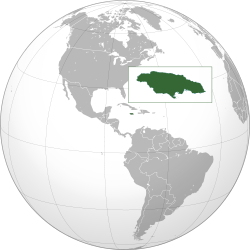Portal:Jamaica
The Jamaica Portal
Jamaica (/dʒəˈmeɪkə/ jə-MAY-kə; Jamaican Patois: Jumieka [dʒʌˈmie̯ka]) is an island country in the Caribbean Sea and the West Indies. At 10,990 square kilometres (4,240 sq mi), it is the third largest island—after Cuba and Hispaniola—of the Greater Antilles and the Caribbean. Jamaica lies about 145 km (90 mi) south of Cuba, 191 km (119 mi) west of Hispaniola (the island containing Haiti and the Dominican Republic), and 215 km (134 mi) south-east of the Cayman Islands (a British Overseas Territory). With 2.8 million people,0 Jamaica is the third most populous Anglophone country in the Americas (after the United States and Canada), and the fourth most populous country in the Caribbean. Kingston is the country's capital and largest city. Most Jamaicans are of Sub-Saharan African ancestry, with significant European, East Asian (primarily Chinese), Indian, Lebanese, and mixed-race minorities. Because of a high rate of emigration for work since the 1960s, there is a large Jamaican diaspora, particularly in Canada, the United Kingdom, and the United States. The country has a global influence that belies its small size; it was the birthplace of the Rastafari religion, reggae music (and such associated genres as dub, ska and dancehall), and it is internationally prominent in sports, including cricket, sprinting, and athletics. Jamaica has sometimes been considered the world's least populous cultural superpower. (Full article...) Selected article -The Rastafari movement developed out of the legacy of the Atlantic slave trade, in which over ten million Africans were enslaved and transported to the Americas between the 16th and 19th centuries. Once there, they were sold to European planters and forced to work on the plantations. Around a third of these transported Africans were relocated in the Caribbean, with under 700,000 being settled in Jamaica. In 1834, slavery in Jamaica was abolished after the British government passed the Slavery Abolition Act 1833. Racial prejudice nevertheless remained prevalent across Jamaican society. The overwhelming majority of Jamaica's legislative council was white throughout the 19th century, and those of African descent were treated as second-class citizens. Christian revivalism was a key influence on Rastafari. Many Afro-Jamaicans joined Christian churches during the Great Revival of 1860–61. They brought with them many inherited African beliefs and rituals, which they syncretised with Christianity in various ways. Some of the new religions that emerged, such as Kumina, remained heavily based on traditional African religion, while others, such as Revival Zion, were more fully Christian. The majority of these groups practiced spiritual healing and incorporated drumming and chanting, counselling, and spirit possession into their structures. Increasing numbers of Pentecostal missionaries from the United States arrived in Jamaica during the early 20th century, this migration reaching a climax in the 1920s. They provided a way for Afro-Jamaicans—who continued to live with the social memory of enslavement and who were denied any substantial participation in Jamaica's political institutions—to express their hopes, fears, and aspirations. (Full article...)Did you know (auto-generated)
Selected biography -
Ena Collymore-Woodstock, OD, MBE (born 10 September 1917) is a Jamaican barrister and magistrate who throughout her career broke many barriers for women. After being orphaned, she joined the Auxiliary Territorial Service and trained as a radar operator, serving in Belgium and Britain. When the war ended, she earned a law degree and returned to Jamaica to become the first woman Court Clerk, Crown Solicitor, and Resident Magistrate. When the Juvenile Courts were established in the country, she served as its chair from 1964 to 1967 and then as a Senior Resident Magistrate until her retirement in 1977. Post-retirement, she served as magistrate for the Turks and Caicos and Anguilla. For her contributions to the development of Jamaica, she was honored as a member of the Order of the British Empire and Jamaica's Order of Distinction. (Full article...)
General images -The following are images from various Jamaica-related articles on Wikipedia.
This is a Good article, an article that meets a core set of high editorial standards.
 The Jamaica national football team, nicknamed the "Reggae Boyz", represents Jamaica in international football. The team's first match was against Haiti in 1925. The squad is under the supervising body of the Jamaica Football Federation (JFF), which is a member of the Caribbean Football Union (CFU), Confederation of North, Central American and Caribbean Association Football (CONCACAF), and the global jurisdiction of FIFA. Jamaica's home matches have been played at Independence Park since its opening in 1962. Their sole appearance in the FIFA World Cup was in 1998, where the team finished third in its group and failed to advance. The team also competed in the Caribbean Cup winning six times. Jamaica also competes in the CONCACAF Gold Cup, appearing thirteen times and finishing twice as runners-up to Mexico in 2015 and the United States in 2017. They were also invited to the Copa América in 2015 and 2016, being eliminated in the group stage on both occasions. Jamaica has also qualified for the 2024 Copa América scheduled to begin June 20, 2024. (Full article...)Selected picture - Destruction of the Roehampton Estate, January 1832, by Adolphe Duperly
Selected cuisines, dishes and foods -Roots wine more commonly known as "roots drink" or "herbal drink" is a type of medicinal beverage popular in Jamaica. It is believed to have healthful and aphrodisiacal qualities for men. Roots wine is made from a variety of herbs and roots, often blended with honey or molasses. It is naturally fermented and slightly effervescent, typically containing less than 5% alcohol. (Full article...)
More did you know
Selected listsTopicsCategoriesRelated portals
WikiProjectsGeographical:
History and Society:
Tasks
Associated WikimediaThe following Wikimedia Foundation sister projects provide more on this subject:
More portals | ||||||||||



















































